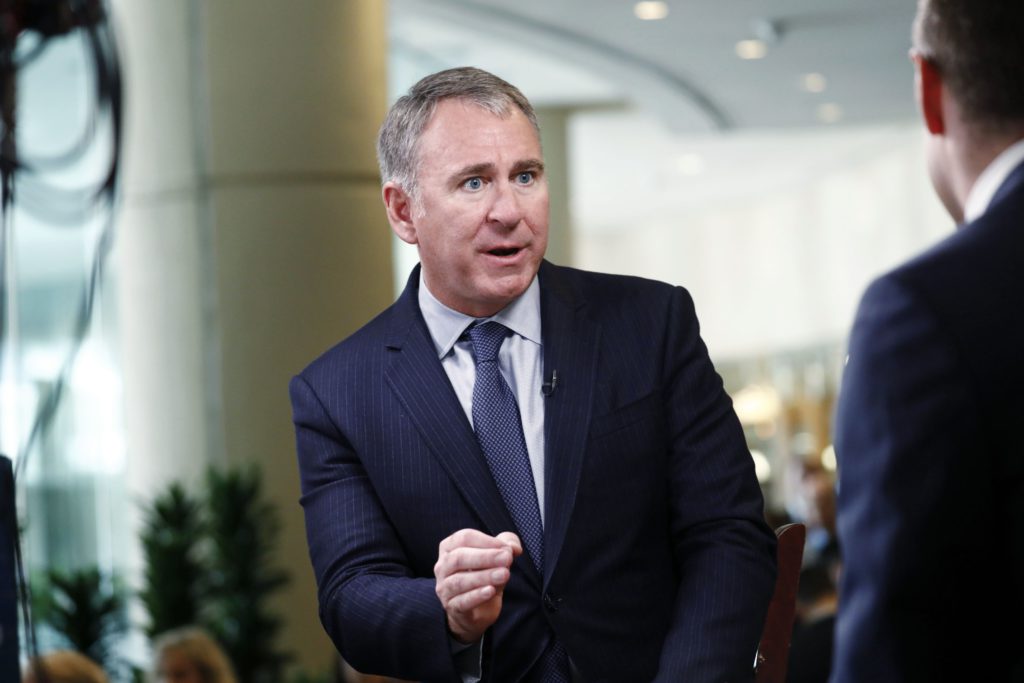(Bloomberg) — Ken Griffin has for years been one of the wealthiest people on the planet thanks to his hedge fund’s success. Now it’s his powerhouse market maker that’s driving the bulk of his fortune to new heights.
The billionaire sold a $1.15 billion stake in Chicago-based Citadel Securities to Sequoia Capital and Paradigm, valuing the firm at approximately $22 billion. After the outside investment, Griffin, 53, will own roughly 80% of the trading business, worth about $17.5 billion.
Citadel Securities’s new valuation raises Griffin’s wealth by $6.5 billion to $27.6 billion and vaults him past Jim Simons, founder of famed quantitative hedge fund Renaissance Capital, and Carl Icahn, according to the Bloomberg Billionaires Index. Within the world of finance, only a handful of people including Warren Buffett, Changpeng Zhao and Stephen Schwarzman are worth more.
Once overshadowed by the hedge fund business in Griffin’s financial empire, Citadel Securities has become a dominant force on Wall Street and is responsible for most of Griffin’s almost $20 billion increase in wealth over the past three years. The firm, which won market share from investment banks after the 2008 financial crisis, has also capitalized on a recent rise in retail trading through apps such as Robinhood Markets Inc. that route customer orders to the market maker in an arrangement known as payment for order flow.
Volatility Surge
Citadel Securities generated net trading revenue of $6.7 billion in 2020, almost double its previous high in 2018, amid a surge in volatility during the onset of the Covid-19 pandemic. Its 2021 revenue was even higher, according to a person with knowledge of the matter, who asked not to be identified because the information isn’t public.
The cash injection will be used to expand both globally and across new asset classes, and could lead to an initial public offering, according to people with knowledge of the plans. A representative declined to comment on any IPO possibilities.
Last year also marked a period of unprecedented — and unwanted — spotlight for Citadel Securities. Its payment-for-order-flow arrangements were at the center of accusations that the firm has conspired with Robinhood and other brokerages to halt trading in shares of GameStop Corp. and other so-called meme stocks during a frenetic period of trading in January 2021.
Weeks later, Griffin appeared before a congressional committee to defend his business. He has repeatedly denied that Citadel Securities had any involvement in Robinhood’s decision to bar customers from buying more shares, and in November a federal judge dismissed a lawsuit accusing the two firms of collusion.
The firm remains the largest provider of payment-for-order-flow fees. Regulations governing the practice are currently being reviewed by the U.S. Securities and Exchange Commission, with Chair Gary Gensler signaling that banning the arrangements could be on the table.
Rapid Growth
Citadel Securities began operation as a broker-dealer in 2002, making markets in equities and options. It grew quickly after the financial crisis, seizing market share from investment banks that were recovering from losses and dealing with more stringent rules and regulations. The firm now also trades foreign exchange, interest-rate swaps and institutional equity options, employing about 1,200 people and operating in more than 50 countries. It’s led by Peng Zhao, who has been part of the company for almost his entire career.
Meanwhile, Griffin’s stake in Citadel’s hedge fund business, which manages about $43.1 billion, is worth $3.7 billion. The calculation of his fortune doesn’t yet include gains from his hedge fund in 2021, so it could move even higher.
In 2020, Griffin made $1.8 billion as his flagship Wellington fund returned 24%. Last year, the same fund was up more than 26%.
Griffin also owns a vast art collection. He purchased Jean-Michel Basquiat’s 1982 painting “Boy and Dog in a Johnnypump” for more than $100 million in mid-2020 and has paid record-high sums for works by Jackson Pollock and Willem de Kooning. A major donor to museums, his name is on the lobby of the Whitney Museum of American Art, a wing at New York’s Museum of Modern Art and a hall at the Art Institute of Chicago.
Griffin’s most recent splashy purchase came last year when he spent $43.2 million to outbid a group of crypto investors for a copy of the U.S. Constitution in a competitive Sotheby’s auction. He said in December that his son encouraged him to buy the document, which he plans to display publicly at Crystal Bridges Museum of American Art in Bentonville, Arkansas.











